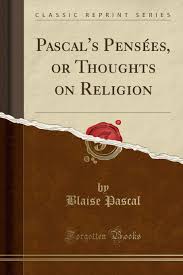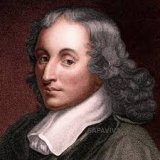Pensées Page #17
The Pensées is a collection of fragments on theology and philosophy written by 17th-century philosopher and mathematician Blaise Pascal. Pascal's religious conversion led him into a life of asceticism, and the Pensées was in many ways his life's work. The Pensées represented Pascal's defense of the Christian religion.
Dancing: we must consider rightly where to place our feet.--A gentleman sincerely believes that hunting is great and royal sport; but a beater is not of this opinion. They imagine that if they obtained such a post, they would then rest with pleasure, and are insensible of the insatiable nature of their desire. They think they are truly seeking quiet, and they are only seeking excitement. They have a secret instinct which impels them to seek amusement and occupation abroad, and which arises from the sense of their constant unhappiness. They have another secret instinct, a remnant of the greatness of our original nature, which teaches them that happiness in reality consists only in rest, and not in stir. And of these two contrary instincts they form within themselves a confused idea, which hides itself from their view in the depths of their soul, inciting them to aim at rest through excitement, and always to fancy that the satisfaction which they have not will come to them, if, by surmounting whatever difficulties confront them, they can thereby open the door to rest. Thus passes away all man's life. Men seek rest in a struggle against difficulties; and when they have conquered these, rest becomes insufferable. For we think either of the misfortunes we have or of those which threaten us. And even if we should see ourselves sufficiently sheltered on all sides, weariness of its own accord would not fail to arise from the depths of the heart wherein it has its natural roots, and to fill the mind with its poison. Thus so wretched is man that he would weary even without any cause for weariness from the peculiar state of his disposition; and so frivolous is he, that, though full of a thousand reasons for weariness, the least thing, such as playing billiards or hitting a ball, is sufficient to amuse him. But will you say what object has he in all this? The pleasure of bragging to-morrow among his friends that he has played better than another. So others sweat in their own rooms to show to the learned that they have solved a problem in algebra, which no one had hitherto been able to solve. Many more expose themselves to extreme perils, in my opinion as foolishly, in order to boast afterwards that they have captured a town. Lastly, others wear themselves out in studying all these things, not in order to become wiser, but only in order to prove that they know them; and these are the most senseless of the band, since they are so knowingly, whereas one may suppose of the others, that if they knew it, they would no longer be foolish. This man spends his life without weariness in playing every day for a small stake. Give him each morning the money he can win each day, on condition he does not play; you make him miserable. It will perhaps be said that he seeks the amusement of play and not the winnings. Make him then play for nothing; he will not become excited over it, and will feel bored. It is then not the amusement alone that he seeks; a languid and passionless amusement will weary him. He must get excited over it, and deceive himself by the fancy that he will be happy to win what he would not have as a gift on condition of not playing; and he must make for himself an object of passion, and excite over it his desire, his anger, his fear, to obtain his imagined end, as children are frightened at the face they have blackened. Whence comes it that this man, who lost his only son a few months ago, or who this morning was in such trouble through being distressed by lawsuits and quarrels, now no longer thinks of them? Do not wonder; he is quite taken up in looking out for the boar which his dogs have been hunting so hotly for the last six hours. He requires nothing more. However full of sadness a man may be, he is happy for the time, if you can prevail upon him to enter into some amusement; and however happy a man may be, he will soon be discontented and wretched, if he be not diverted and occupied by some passion or pursuit which prevents weariness from overcoming him. Without amusement there is no joy; with amusement there is no sadness. And this also constitutes the happiness of persons in high position, that they have a number of people to amuse them, and have the power to keep themselves in this state. Consider this. What is it to be superintendent, chancellor, first president, but to be in a condition wherein from early morning a large number of people come from all quarters to see them, so as not to leave them an hour in the day in which they can think of themselves? And when they are in disgrace and sent back to their country houses, where they lack neither wealth nor servants to help them on occasion, they do not fail to be wretched and desolate, because no one prevents them from thinking of themselves. 140 [How does it happen that this man, so distressed at the death of his wife and his only son, or who has some great lawsuit which annoys him, is not at this moment sad, and that he seems so free from all painful and disquieting thoughts? We need not wonder; for a ball has been served him, and he must return it to his companion. He is occupied in catching it in its fall from the roof, to win a game. How can he think of his own affairs, pray, when he has this other matter in hand? Here is a care worthy of occupying this great soul, and taking away from him every other thought of the mind. This man, born to know the universe, to judge all causes, to govern a whole state, is altogether occupied and taken up with the business of catching a hare. And if he does not lower himself to this, and wants always to be on the strain, he will be more foolish still, because he would raise himself above humanity; and after all he is only a man, that is to say capable of little and of much, of all and of nothing; he is neither angel nor brute, but man.] 141 Men spend their time in following a ball or a hare; it is the pleasure even of kings. 142 Diversion.--Is not the royal dignity sufficiently great in itself to make its possessor happy by the mere contemplation of what he is? Must he be diverted from this thought like ordinary folk? I see well that a man is made happy by diverting him from the view of his domestic sorrows so as to occupy all his thoughts with the care of dancing well. But will it be the same with a king, and will he be happier in the pursuit of these idle amusements than in the contemplation of his greatness? And what more satisfactory object could be presented to his mind? Would it not be a deprivation of his delight for him to occupy his soul with the thought of how to adjust his steps to the cadence of an air, or of how to throw a [ball] skilfully, instead of leaving it to enjoy quietly the contemplation of the majestic glory which encompasses him? Let us make the trial; let us leave a king all alone to reflect on himself quite at leisure, without any gratification of the senses, without any care in his mind, without society; and we will see that a king without diversion is a man full of wretchedness. So this is carefully avoided, and near the persons of kings there never fail to be a great number of people who see to it that amusement follows business, and who watch all the time of their leisure to supply them with delights and games, so that there is no blank in it. In fact, kings are surrounded with persons who are wonderfully attentive in taking care that the king be not alone and in a state to think of himself, knowing well that he will be miserable, king though he be, if he meditate on self.
Translation
Translate and read this book in other languages:
Select another language:
- - Select -
- 简体中文 (Chinese - Simplified)
- 繁體中文 (Chinese - Traditional)
- Español (Spanish)
- Esperanto (Esperanto)
- 日本語 (Japanese)
- Português (Portuguese)
- Deutsch (German)
- العربية (Arabic)
- Français (French)
- Русский (Russian)
- ಕನ್ನಡ (Kannada)
- 한국어 (Korean)
- עברית (Hebrew)
- Gaeilge (Irish)
- Українська (Ukrainian)
- اردو (Urdu)
- Magyar (Hungarian)
- मानक हिन्दी (Hindi)
- Indonesia (Indonesian)
- Italiano (Italian)
- தமிழ் (Tamil)
- Türkçe (Turkish)
- తెలుగు (Telugu)
- ภาษาไทย (Thai)
- Tiếng Việt (Vietnamese)
- Čeština (Czech)
- Polski (Polish)
- Bahasa Indonesia (Indonesian)
- Românește (Romanian)
- Nederlands (Dutch)
- Ελληνικά (Greek)
- Latinum (Latin)
- Svenska (Swedish)
- Dansk (Danish)
- Suomi (Finnish)
- فارسی (Persian)
- ייִדיש (Yiddish)
- հայերեն (Armenian)
- Norsk (Norwegian)
- English (English)
Citation
Use the citation below to add this book to your bibliography:
Style:MLAChicagoAPA
"Pensées Books." Literature.com. STANDS4 LLC, 2024. Web. 26 Nov. 2024. <https://www.literature.com/book/pens%C3%A9es_114>.




Discuss this Pensées book with the community:
Report Comment
We're doing our best to make sure our content is useful, accurate and safe.
If by any chance you spot an inappropriate comment while navigating through our website please use this form to let us know, and we'll take care of it shortly.
Attachment
You need to be logged in to favorite.
Log In